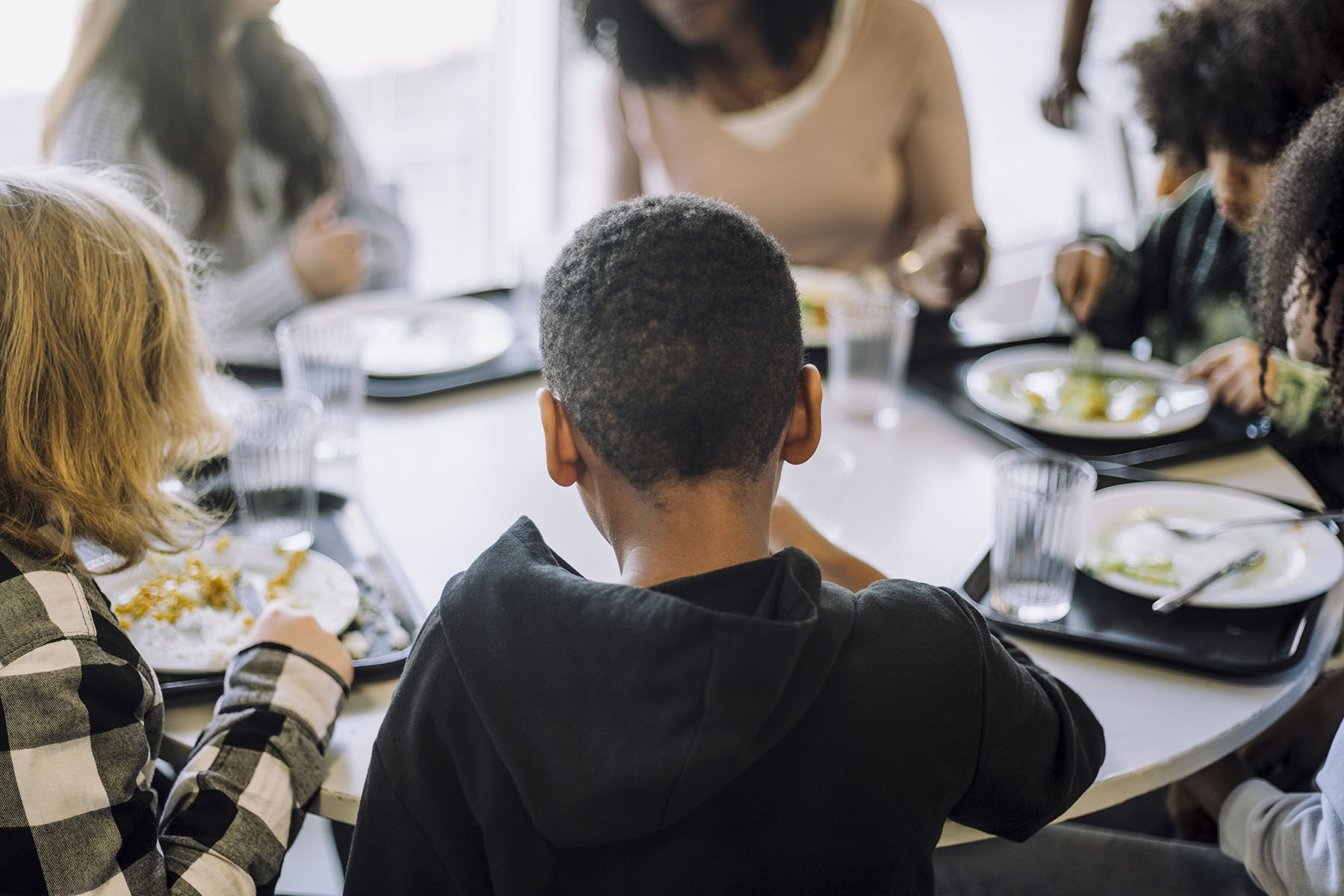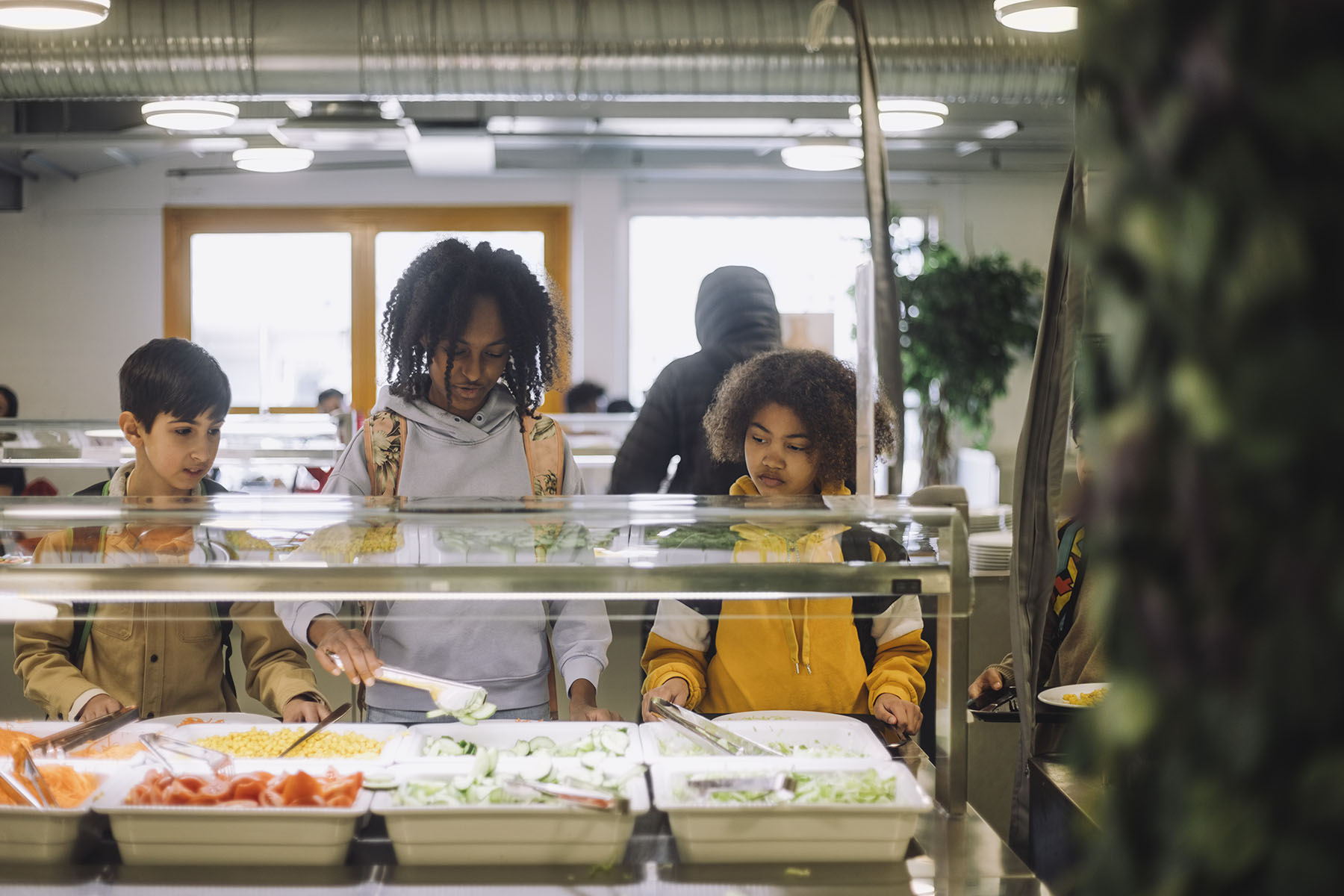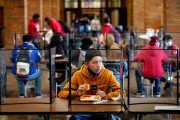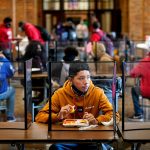Your trusted source for contextualizing the news. Sign up for our daily newsletter.
Heather Gustafson knows what it’s like to struggle to keep money in her children’s meal accounts at school. Now a Minnesota state senator, Gustafson spent several years as a single mother raising four kids on a modest teacher’s salary.
Although she suspects her income would’ve qualified her children to receive free or reduced-price school lunch, she never completed the paperwork to determine their eligibility.
“One of the reasons I didn’t fill out the form was because I assumed that it … was some cumbersome thing that I had to prove with a bunch of forms,” she said. “There was also this shame of, like, ‘Well, maybe, if I just get a second job, then it won’t be so embarrassing.’”
Thanks to universal school meals legislation that Gustafson and Rep. Sydney Jordan sponsored in the state legislature, Minnesota parents will no longer have to worry about keeping their kids fed at school. The law provides free lunch and breakfast to the state’s K-12 students regardless of household income. Signed into law by Gov. Tim Walz in the spring, the legislation took effect July 1 and will cost Minnesota about $400 million in the program’s first two years.
Minnesota’s universal free meal legislation is part of a burgeoning national movement to provide all students with no-cost breakfast and lunch. Through the end of the 2021-22 school year, the federal government provided free meals as part of its pandemic response, no matter a family’s ability to pay. That effort gave Minnesota and five other states — California, Maine, Colorado, New Mexico and Vermont — the momentum to pass free school meal legislation.
The lawmakers and advocates who fought to implement Minnesota’s Free School Meals Program expect it to improve student health, behavior, attendance and performance; end the stigma associated with receiving free or reduced-price lunch; and stop lunch shaming practices in which students without money for meals are overtly or covertly penalized.
“Children are not going to be stressed out about their parents’ ability to pay for their food or how they’re going to eat,” Jordan said. “They’re not going to be thinking about their empty stomach. They’re going to be able to focus on reading and learning math and doing science projects. They’re also going to be able to get along with their friends and classmates and other people in the school better because we know that there are huge behavioral improvements that happen when we feed kids.”
Food insecurity — or inconsistent access to the nutrition required to meet one’s physiological needs — has been linked to school absences, poor reading and math test scores, and misbehavior. Small children experiencing food insecurity are more likely to repeat a grade.
Single-headed households are particularly vulnerable to the problem. In 2021, nearly a quarter of households headed by single mothers were food insecure. While school meals help to combat food insecurity, a family’s income must be less than 130 percent of the federal poverty line to qualify nationally for free breakfast and lunch. In Minnesota, about 1 in 6 children is food insecure but 1 in 4 of these students missed the cutoff to receive free or reduced meals.
Universal school meals especially benefit children from families just outside the eligibility range for free or reduced breakfast and lunch. The universal approach also helps families whose financial circumstances fluctuate throughout the school year or who are economically disadvantaged but unwilling or unable to complete the paperwork to get free or discounted meals. Although federal regulations still require schools in states with universal lunch to distribute applications for free meal benefits, Minnesota students will not be refused meals if their families don’t complete the forms.
“I don’t know any parents who don’t want to provide for their kids, but life is hard, and it’s harder for some than it is for others,” said Gustafson, a Democrat. “And one of the things that we learned about when we sort of dug into this policy and what it might look like is that those forms are an obstacle. They’re a barrier. We know that about 18 percent of students in Minnesota who would qualify for either free or reduced lunch were not getting that benefit because of these forms that they were supposed to fill out.”
-
Read Next:
Gustafson said that some parents don’t complete applications for lunch benefits because they were earning decent salaries when school began, only to become unemployed during the course of the academic year. Other families are highly transient and lose track of the paperwork they need to fill out amid their many moves. And some encounter language barriers or are new to a school and unaware they need to complete an application after switching campuses.
“Families are complicated … so this is a really good reason why [school meals] should not be a means-based benefit,” Gustafson said. “Just let kids who are going to school have access to food while they’re at school. We require them to be at school. I think we should take care of them while they’re there.”
Getting a universal free meals bill passed wasn’t easy. “This didn’t just happen,” Jordan said. It required a concerted effort from activists and Democrats gaining control of both chambers of the legislature. In 2021 and 2022, Jordan held hearings on free school meals before the legislation was greenlit this year. Although Walz, a Democrat, supported the policy, Minnesota’s divided legislature kept it from passing initially.
“But this year, we did flip our Senate, and the Senate agreed that it was important to feed the kids,” Jordan, a Democrat, said.
She suspects that the federal government’s free pandemic-era meals also contributed to the legislation’s passage. “When the federal government provided universal meals, it proved that it could be done in Minnesota,” she said.

The Hunger-Free Schools Campaign — made up of more than 25 partner organizations based in the state and nationally — collaborated over the past few years to press Minnesota lawmakers to approve the legislation. Campaign members include the American Diabetes Association, Blue Cross and Blue Shield of Minnesota, the Food Research and Action Center, Land O’Lakes, the Minnesota School Social Workers Association, the Service Employees International Union, and Hunger Solutions Minnesota.
“I’m very grateful for a really broad, diverse coalition that came together to get this done,” said Leah Gardner, policy director at Hunger Solutions Minnesota. “As we see this unfold from one state to the next, I think it’s going to become even more clear that this is the obvious thing to do, that the thought of only some kids get meals and some kids don’t, or you have to pay for food when you don’t have to pay for any other aspects of education — I think we’re hopefully going to see a change in philosophy around why this matters and start to see movement across the whole country.”
Bukata Hayes, vice president of racial and health equity and chief equity officer for Blue Cross and Blue Shield of Minnesota, describes the universal free meals legislation as “a deep investment in the future.” Providing students with free school meals, he said, may lower their chances of developing diabetes, hypertension and other adverse health outcomes associated with poor diets. As a partner of the Hunger-Free Schools Campaign, Hayes provided testimony to legislators about how food access is a social determinant of health.
“What we tried to do is talk about food insecurity in our state and how this [universal free meals] was a really powerful solution for addressing that with youth and families and school-age children,” Hayes said. “That’s how we won. We believed in the legislation, we advocated for the legislation and we put our reputation and brand as Blue Cross and Blue Shield of Minnesota behind it.”
Ensuring that all students are fed in schools appealed to Hayes not only on a professional level but on a personal one, too. He grew up one of four boys raised by a single mother.
“So she would send us off to school, having some degree of certainty or reassurance that while at school, we would get something to eat,” he said. “I’m a product of social investments like this.”
Knowing that he and his brothers would have school meals was one less stressor for both himself and his mother, Hayes said.
A high school history teacher, Gustafson said that she’s witnessed firsthand the distress students feel when they’re hungry. Some of them have come into her classroom between periods to discreetly ask for a lunch or a snack because they didn’t eat breakfast that day, she said. Sometimes students confide in her that they have had no access to food for days.
“And they’ll be looking for food not just for themselves but also for their siblings,” Gustafson said. “So we knew that this was going on. I think every teacher probably recognizes pieces of my story and probably can add to my story. Really, the bottom line is that hungry kids can’t learn, right? They can’t effectively. We can’t effectively invest in our education system without making sure that every student has access to school meals.”
In the past, Minnesota students with negative balances in their meal accounts faced a practice known as lunch shaming in which they may have been served a cold cheese sandwich instead of the warm meals their peers received. Their school may have barred them from participating in events like prom or graduation or receiving a yearbook. Nationally, schools have enlisted the help of collection agencies to recover meal debt, damaging the credit of families who are already financially struggling. In 2014, Minnesota became one of the first states to pass anti-lunch-shaming legislation, but it had to enact additional legislation in the several years that followed, as lunch shaming can take many forms — from removing students from cafeterias to stamping their hands.
“We worked for about a decade to really get it done fully, where we prohibit that type of lunch shaming here in Minnesota,” Gardner said. “After passing not just one but two laws to try to make it crystal clear what schools cannot do, we still had to rely on our attorney general to declare, for example, serving an alternative meal like a cheese sandwich as a form of stigma and to simply not feed a child, again, as a form of stigma. There was one issue after another because we weren’t getting to the root of the problem, which is the families would be paying if they could, but they can’t afford to.”
Older students typically know that their meal accounts are in arrears and avoid the lunch line altogether so they won’t be shamed in front of their peers, Gardner said. Students eligible to receive free or reduced meals also experience stigma and fear of standing out from their peers, Gardner said.
“During COVID, it was very different when everyone could eat and the meals were covered,” Gardner said. “It finally felt like that stress was gone, that stigma was gone and more people started eating. So, that’s what really drove us to want to preserve that as the reality we think that all students deserve.”
Now that universal free lunch is a reality in Minnesota schools, Jordan expects school personnel to benefit as well as students and families. Teachers and other personnel will no longer have to pack extra lunches for students without meals, she said. Cafeteria workers will no longer feel the dread that accompanies turning a child away from the lunch line. School nutrition staff won’t have to spend their time trying to recover meal debt.
The select number of Minnesota students enrolled in summer school or related programs are already enjoying the benefits of the universal free meal policy. But thinking about the first day of the 2023-24 school year, when all students will begin getting free meals, fills Jordan with anticipation.
“There’s going to be breakfast waiting for every Minnesota student when they show up in the fall,” she said. “I just think it’s going to be a happier and healthier Minnesota, and I’m really, really, really excited about it.”








